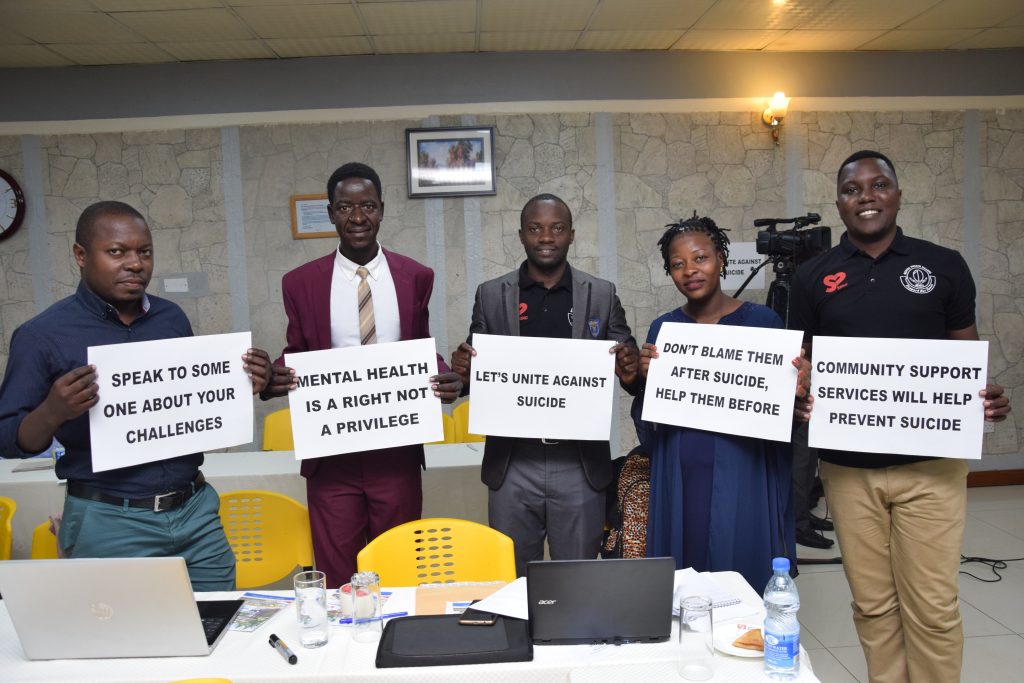
Mental Health Uganda candle light event helped to break the silence on stigma as mental health Champions shared their experiences in a celebration mark the annual world mental health day at hotel Africana.
Sarah Tushemereirwe, a Champion and partner with Mental Health Uganda,in an emotional panel discussion revealed how she attempted several times to take away her life. “I wanted to take my life to end the pain I was going through and reduce the burden of my condition to the family but God still wanted me to live, I am here to share my story so as to shed light on such a topic which remains highly secretive and a taboo to talk about”Tushemereirwe said.
Even then she acknowledged that, suicide as a mental disorder can be prevented because people look at it as the last resort to ending the pain they are going through. However, with immediate support the condition can be tamed.
She further noted that, the stigma associated with having a mental illness is immense coupled withcriminalization around it. However, she believes “suicide prevention” as the theme of this year’s world mental health day celebration will save many lives. She is skeptical that to amplify voices, the population needs to be educated to understand the various preconditions that can cause mental health illness vis-à-vis the problems they present..
In his remarks,Derrick Kizza, the Executive Director Mental Health Uganda revealed that suicide is real and a number of suicide cases remain undocumented because people fear to report cases of suicide and attempted suicide to police for fear of being held accountable.
Indeed, according to the penal code, a person who attempts suicide is to be incarcerated and in chapter 20, under offences connected with murder and suicide, any person who attempts to kill himself or herself commits a misdemeanor.
He cited cultural practices and societal break down including the absence of family support mechanisms as another impediment in curbing mental health related issues in the country. He adds that, there will always be warning signs for people with mental health problems but often they are ignored by their own families and friends.
“People who have died by suicide have always at a single point shared how they want to end their lives but those around them rub them the wrong way, they are not given attention or are asked to go on with their action” Kizza said.
That alone is an indication of a planned actionbesides other signs that could depictthat someone is about to commit suicide which he says should never be ignored.
With an aim of spurring conversation around mental health condition in the country, Mental Health Uganda held a candle light event that hadguests and champions lightup candles in good gestures of hope for those going through the darkest moments of their lives.
With a localized theme of “Getting Suicide out of the shadows in Uganda” the 40 seconds of action for mental health was the best for champions, stakeholders and activists to tell in-depth personal and heart felt experiences.
“The candle is symbolic in our lives, the darkness after the lights were switched off represents the troubles and sad moments we go through. When I received a candle light from another person I felt hopeful, I realized I was not alone, my neighbour and friends were like my source of inspiration to live again. Passing on the light myself, was a sign of responsibility that we urge everyone to embrace in trying to help people undergoing mental health challenges” said WilbroadKabagambe, a Mental Health champion.
Pat Robert Larubi, the communications officer at Mental Health Uganda says the event is one in a series of actions aimed at opening up conversations around mental health. A moment where people are able to speak out about their experience of mental health problems like depression, anxiety, bipolar and addiction, find help, challenge myths and change how people in the heart of Kampala and the country at large think about mental health.
“As Mental Health Uganda we want to create a unified voice of people that influence the provision of required services and opportunities in favour of people with and survivors of mental illness in Uganda through capacity building, networking, advocacy and partnerships.
The most cardinal part of is event is to challenge everyone to start a national conversation about suicide. Silence can have tragic results while knowledge will save lives given the fact that 1-4 people in the world experience a mental health problem at some point in their life, according to the World Health Organization (WHO).
Our campaign is part of a global movement with other campaigns happening across the world as human rights activist, defenders, policy makers, survivors and/or champions join hands to bring their voices forward for action.
In Uganda, there are numerous challenges that come when one gets first or subsequent episodes of relapse from mental health problems. They are ridiculed and labelled leading to society or self-isolation due to the stigma. Most people with mental health complications have not been equally welcomed to the world of work, they wallow in poverty besides their rights being abused.
